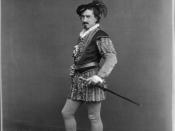Othello: A Web of Deceit The theme of honesty, as well as its counterpart dishonesty, is inextricably woven throughout the plot of Othello. The villain Iago is the engineer of the ingenious misrepresentations on which the story centers. Every character falls tragically into his carefully contrived web of deceit.
From the beginning, a virtually unconditional trust of Iago is forged among the characters. He is referred to time and time again as "honest"ÃÂ and "good."ÃÂ Othello once asks "Honest Iago, that looks dead with grieving, / Speak, who began this? On thy love, I charge thee"ÃÂ (2.3.178-179).* Shortly thereafter, Cassio tells him "Good night, honest Iago!"ÃÂ (2.3.336). Much later, Desdemona inquires of him "O good Iago, What shall I do to win my lord again?"ÃÂ (4.2.150-151). Iago gains this undeserved trust by taking full advantage of his knowledge of human nature, as well as each individual's shortcomings. In reference to Othello and Cassio, and with cunningly ambiguous pronoun usage, he says, He holds me well.
The better shall my purpose work on him.
To get his place and to plume up my will In double knavery: how? how? Let's see."ÃÂ Cassio's a proper man. Let me see now."ÃÂ After some time t'abuse Othello's ear That he is too familiar with his wife.
He has a person and a smooth dispose To be suspected, fram'd to make women false; The Moor is a free and open nature too, That thinks men honest that but seem so, And will as tenderly be led by th'nose As asses are. (1.3.389-401) Iago is aware of Othello's inferiority complex, Cassio's loss of reason under intoxication, Roderigo's hopeless infatuation with Desdemona, Desdemona's naÃÂïve innocence, and he deviously employs each of these flaws in him scheme.
Through his speech, Iago illustrates his machinations as...
![From the Library of Congress: TITLE: Thos. W. Keene. Othello CALL NUMBER: POS - TH - 1884 .O7, no. 1 (C size) [P&P] REPRODUCTION NUMBER: LC-USZC6-58 (color film copy transparency) RIGHTS INFORMATION: No known restrictions on publication. MEDIUM: 1 print (](https://s.writework.com/uploads/9/94760/library-congress-title-thos-w-keene-othello-call-number-pos-thumb.jpg)

